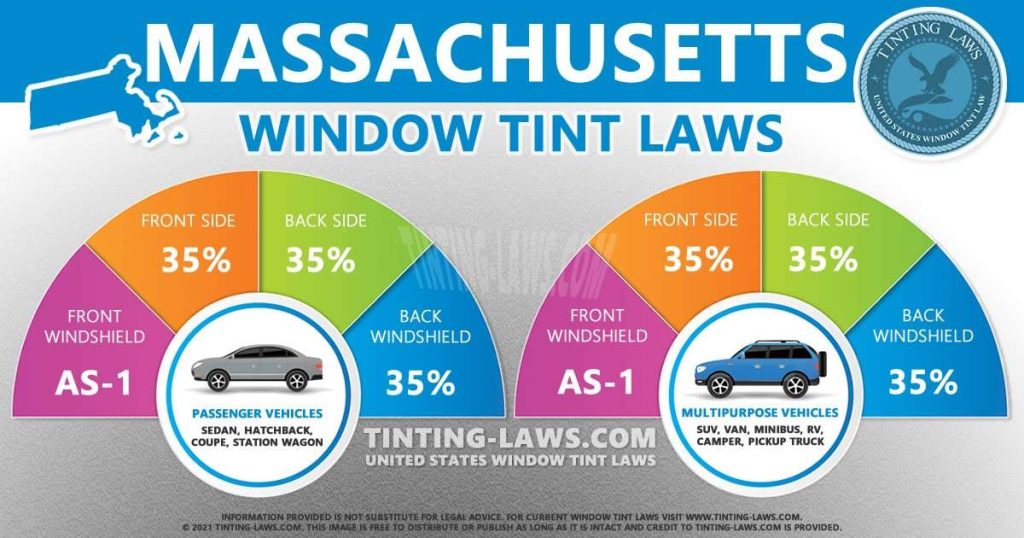Massachusetts Window Tinting Laws
Car window tinting laws in Massachusetts were enacted in 1985.
We have provided all the necessary information about your car’s window tint, including how dark or reflective the tint is allowed in your state.
There are also additional car window tinting rules and regulations in Massachusetts so make sure you read all about it below.
Window tint darkness in Massachusetts
The percent of visible light allowed through your car windows is called VLT: Visible Light Transmission.
The percentage of light allowed through your film and glass in Massachusetts is very specific and different for sedan cars and SUV cars or vans.
Tint darkness for sedans:
- Windshield: Non-reflective tint is allowed on the AS-1 line or top 6 inches of the windshield.
- Front Side windows: Must allow more than 35% of light in.
- Back Side windows: Must allow more than 35% of light in.
- Rear Window: Must allow more than 35% of light in.
Tint darkness for SUV and vans:
- Windshield: Non-reflective tint is allowed on the AS-1 line or top 6 inches of the windshield.
- Front Side windows: Must allow more than 35% of light in.
- Back Side windows: Must allow more than 35% of light in.
- Rear Window: Must allow more than 35% of light in.
Window tint reflection in Massachusetts
Window tint can reflect incoming light and reduce glare and heat.
Massachusetts window tint law permits a certain window reflection when using a tint so make sure you pay attention to this as well.
Tint reflection for sedans:
- Front Side windows: Must not be more than 35% reflective.
- Back Side windows: Must not be more than 35% reflective.
Tint reflection for SUV and vans:
- Front Side windows: Must not be more than 35% reflective.
- Back Side windows: Must not be more than 35% reflective.
Other Massachusetts window tint rules and regulations:
Massachusetts does have several other important laws, rules and regulations pertaining to window tinting. They include the following:
- Side Mirrors: Dual side mirrors are required if back window is tinted.
- Restricted Colors: In Massachusetts no specific auto tint colors are prohibited from use.
- Certificates: Manufacturers of film are not required to certify the film they sell in the state.
- Stickers: State law recommends but does not require stickers to identify legal tinting.
- Medical Exceptions: Massachusetts does permit medical exemptions for special tint. For more details about the specific terms of the exemption, consult your state law.
- Penalties: Up to $250 fine. Third or subsequent convictions will result in 90 day drivers license suspension.
Keep in mind that Massachusetts tinting laws and regulations may be interpreted differently in your county or place of residence.
We always recommend double-checking our information with your local DMV or law enforcement authorities.

Our information about window tint laws in Massachusetts was last updated in 2024.
Tinting laws in Massachusetts were enacted in 1985.
In case any of our info provided is not up to date or correct be sure to contact us so we can fix it. Thanks!
Trusted industry leader in providing accurate window tint laws. Share with confidence:
State of Massachusetts Info
Massachusetts, officially the Commonwealth of Massachusetts, is a state in the New England region of the northeastern United States.
It is bordered by Rhode Island and Connecticut to the south, New York to the west, and Vermont and New Hampshire to the north; at its east lies the Atlantic Ocean.

Massachusetts is the 7th smallest, but the 14th most populous and the 3rd most densely populated of the 50 United States.
Many of Massachusetts’ towns, cities, and counties have names identical to ones in England.
Massachusetts is the most populous of the six New England states and has the nation’s sixth highest GDP per capita.
Capital: Boston
Population: 6,646,144
Area: 10,555 sq mi (27,336 km2)
Cities in Massachusetts: Boston, Cambridge, Watertown, Salem, Worcester, Springfield, Framingham, Brookline, Newton, Lowell, Somerville, Quincy, Waltham, New Bedford, Plymouth, Amherst, Provincetown, Northampton, Woburn, Gloucester, Concord, Natick, Andover, Fall River, Medford, Braintree, Wellesley, Brockton, Chicopee, Arlington, Revere, Barnstable, Haverhill, Weymouth, Lynn, Newburyport, Falmouth, Beverly, Pittsfield, Hyannis, Taunton, Peabody, Foxborough, Chelmsford, Needham, Dedham, Rockport, Lexington, Malden, Billerica
Counties in Massachusetts: Barnstable, Berkshire, Bristol, Dukes, Essex, Franklin, Hampden, Hampshire, Middlesex, Nantucket, Norfolk, Plymouth, Suffolk, Worcester